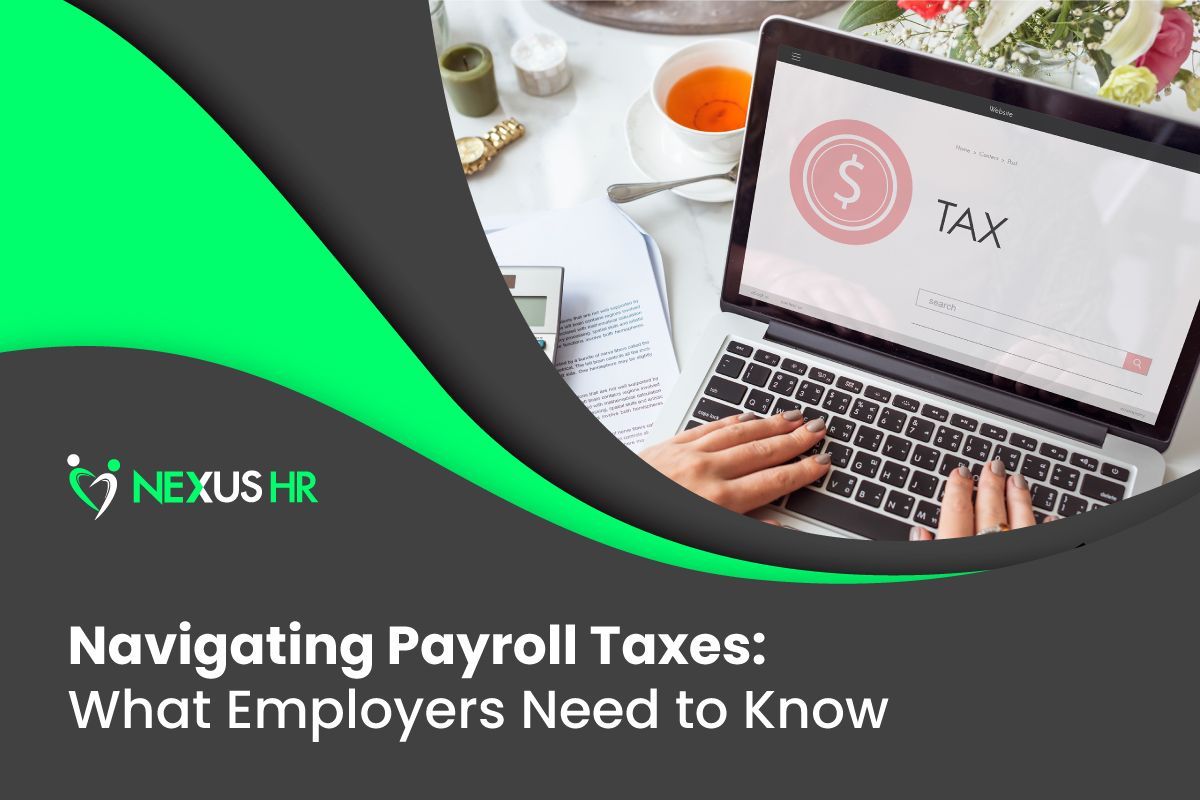Get in touch
877-922-5867
Info@Nexushr.com
877-922-5867
How to Support Your Employees' Mental Health
Nearly 53 million adults in the U.S. face mental health issues in any given year. That represents one in five adults, so chances are someone in your workplace is facing the struggle right now.
Unfortunately, not everyone who needs help will get it. As a result, many employees who experience mental health issues end up either missing work or showing up but are unable to fully function.
The
World Health Organization estimates that, on a global economic scale, anxiety and depression alone cost an estimated $1 trillion per year in lost productivity. Mental health doesn’t just affect one person; its impact ripples across homes, communities, and workplaces.
Why Employee Mental Health Matters to Your Organization

With the average full-time worker spending most of their waking hours at work, workplaces profoundly shape one’s mental well-being.
Your organization’s work environment, culture, and values can make or break your employees’ mental health.
As an employer, you have the influence and authority to make decisions that support employee mental health and, by doing so, build up your organization’s success. On the other hand, ignoring and mismanaging employee mental health can lead to problems in key areas of your business operations:
1. Decreased Productivity
One’s mental health is closely linked to one’s productivity. According to Psychology Today, poor mental health can severely decrease employee motivation and productivity while increasing stress. Certain mental disorders can also interfere with focus and attention, making it even harder for them to get tasks done.
Mental health issues may appear to be an individual problem, but it’s a problem for their employers, too. If left untreated, mental health issues can cost your company
$9,450 per employee per year in absences and decreased productivity.
2. Increased Staff Turnover
Since early 2021, millions of employees all over the country have been voluntarily resigning from their jobs in what is dubbed The Great Resignation. Many joined the movement because of work-related stress from being overworked and underpaid.
The Great Resignation reflects an ongoing mental health crisis in the United States. Work stress and burnout were already alarmingly high even before COVID hit, and the pandemic acted as a tipping point and accelerant for what was bound to happen.
The lesson here is this: Unless company leaders prioritize their employees’ mental health, they will continue to experience high staff turnover, negatively impacting their business productivity and bottom line.
Read More:
5 Ways to Increase Employee Retention
3. Strained Team Dynamics
In a letter to Inc. Wellness, one manager described their employee as “tired, unfocused, unorganized, and not meeting deadlines. She oversleeps and comes in late at least once a week.” The employee may sound difficult and lazy, but the letter reveals that she’s not. She’s just struggling with depression, and it’s affecting her performance and relationships at work.
Employees with poor mental health can experience difficulty dealing with pressure, handling negative feedback, responding to change, and interacting with others. This can quickly lead to tension among members, low team morale, and strained workplace dynamics.
What You Can Do to Support Employee Mental Health

Stress isn’t always bad. It’s a normal response to the many demands in the workplace. In short bursts, stress can help you focus, stay alert, and perform at your best.
However, too much stress is unhealthy.
The Help Guide describes the workplace in today’s hectic world as an emotional roller coaster with long hours, tight deadlines, and ever-increasing demands that can leave one feeling worried, drained, and overwhelmed.
Work stress can be helpful, but when it exceeds one’s ability to cope, it becomes detrimental to their physical and mental well-being.
As an employer and company leader, you have the unique opportunity to leverage your position to promote and protect your staff’s mental health at work, especially in the face of pressure, unanticipated change, and uncertainty.
Here are a few things you can do to support your team’s mental health during difficult times:
1. Be Honest
Ever since the pandemic hit, mental health has become a more talked about topic. Everyone has gone through some type of struggle during tough times, even company leaders like you.
Acknowledge the struggle that people and communities are experiencing and show your team that you know this is a difficult time for many, including yourself. You can even share how you are coping.
When leaders are willing to be vulnerable and honest about mental health matters, employees realize they are not alone in what they feel and experience.
According to Mind Share Partners leaders
Kelly Greenwood and Natasha Krol, “When managers describe their challenges, whether mental-health-related or not, it makes them appear human, relatable, and brave. Research has shown that authentic leadership can cultivate trust and improve employee engagement and performance.”
2. Foster a Culture of Communication
Employees struggling with their mental health often have feelings of isolation and helplessness. And because they spend most of their waking hours in the workplace, it’s crucial that they feel comfortable opening up about their struggles and asking for help when they are there.
By fostering a culture of communication, you can create safe spaces for discussions about mental health in the workplace. Remember that a one-time webinar on mental health isn’t enough to create a culture. With the support of a
strong HR team, leaders should check in with team members regularly to discuss life and work.
Communication must also be two-way, so it’s vital that you listen to what your members are saying. According to the
American Psychological Association (APA), 48% of employees say lack of involvement in decisions contributes to stress in the workplace.
Give employees the opportunities to participate in decisions that affect their jobs. Proactively solicit feedback from them, use that valuable information to inform your decisions, and communicate any positive changes that took place because of it.
3. Educate & Equip Your Team to Promote Mental Well-Being
Consider training the managers and supervisors in your organization in skill sets that support employee well-being, such as recognizing the signs and symptoms of mental health issues and knowing what to do when they see them.
“It’s important for managers to be trained to recognize the signs of emotional distress so they can react in a supportive rather than a punitive way,” says clinical neuropsychologist
Jerome Schultz, Ph.D.
According to an
APA study, leaders who went through at least three hours of mental health awareness training reported improved attitudes about mental health and a higher motivation to promote it at work.
By educating and equipping your managers with the knowledge they need to support and promote employee mental health, you can more effectively mobilize your organization’s mental health initiatives.
4. Strengthen Prevention Efforts
The old saying “prevention is better than cure” also applies to mental health in the workplace. Your organization’s ultimate goal should go beyond spotting and addressing mental health issues within the team; it should help prevent them from developing in the first place.
You can strengthen your prevention efforts in various ways—they don’t have to be a full-blown campaign. You can start by offering perks to help employees take better care of themselves. These include free or subsidized lifestyle coaching, self-management programs, or gym memberships.
You can also host seminars or workshops that teach your team different stress management techniques like breathing exercises, mindfulness, or meditation.
If you want to make an even bigger difference, give your employees more options for where, when, and how they work. According to the
APA’s 2021 Work and Well-being Survey, 34% of employees say flexible hours would help their mental health.
While remote, hybrid, and flexible work arrangements may not work for every employee in your company, the APA says, “The key is to give employees the agency to select from among an array of reasonable options that balance business needs with their personal circumstances.”
Read More:
In-Office, Remote, or Hybrid Work: Which One is Best?
5. Remove (or Reduce) Workplace Stressors
Strengthen Your Workplace Mental Health with Nexus HR
This sounds like a no-brainer, but it’s surprising how many workplace stressors exist. Stressors are everywhere, from the tasks an employee is given, to the processes they follow, to the people they work with.
As an employer, you can help ensure these stressors don’t overwhelm your team by identifying them and allocating your resources to remove (or at least reduce) them.
When welcoming new hires, have a
solid onboarding process in place and partner with an HR team that provides
excellent remote onboarding support.
Help current employees avoid unnecessary frustration by providing clear-cut task descriptions, responsibilities, and deadlines. Money matters can also stress employees, so ensure your company has a
reliable payroll management system to avoid errors and delays.
If they have questions or concerns about work, encourage them to communicate. Partnering with a full-service human resource company like
Nexus HR can help you manage employee communications and ensure your team is heard.

Investing in your employees’ mental well-being can deliver numerous benefits to your organization: increased efficiency, increased productivity, lower staff turnover, and increased job satisfaction. If you’re unsure how to start or sustain it, partnering with a reputable HR company like Nexus HR is a smart first move.
With its team of experienced HR professionals, tried-and-tested recruitment process, comprehensive payroll solution, and easy-to-use employee platform, Nexus HR provides end-to-end HR support for your organization.
With dedicated HR experts taking care of your administrative tasks, you can take a step back and focus on supporting your employees’ mental health.











